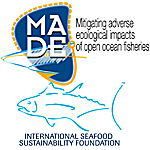In January 2010, a multinational initiative started tagging blue sharks off the coast of Brazil and South Africa using Pop-up Satellite Archival Tags (PSAT) aiming to collect movement data information. A total of 28 blue sharks were tagged, with 7 sharks tagged in each of the four geographical regions of the southern Atlantic Ocean (NW, SW, SE, NE). The information collected by this project (i.e., the ecology of movement patterns and the associated habitat and behavioral studies) has improved the understanding on Atlantic blue shark ecology. The findings document trans-oceanic migration of blue sharks and include a case where an adult female traveled from its tagging site near the northeast coast of Brazil to the Gulf of Guinea off the west coast of Africa. Also, it was found that blue sharks movement is significantly influenced by climatic variables. In particular, in this study we show, using a data-driven stochastic modeling approach that the decision to leave or arrive to a particular location is strongly influenced by the depth of the thermocline. The stochastic model is a Discrete-Self-Decomposable Markov Chain. Furthermore, we illustrate how the estimated habitat suitability as a function of the environmental conditions from the movement data can be used to obtain process-based predictions of the inter-annual and spatial fluctuations in CPUEs. Finally, we illustrate how this approach can be extended to other pelagic fisheries.
- Presentation

 PDF version
PDF version
